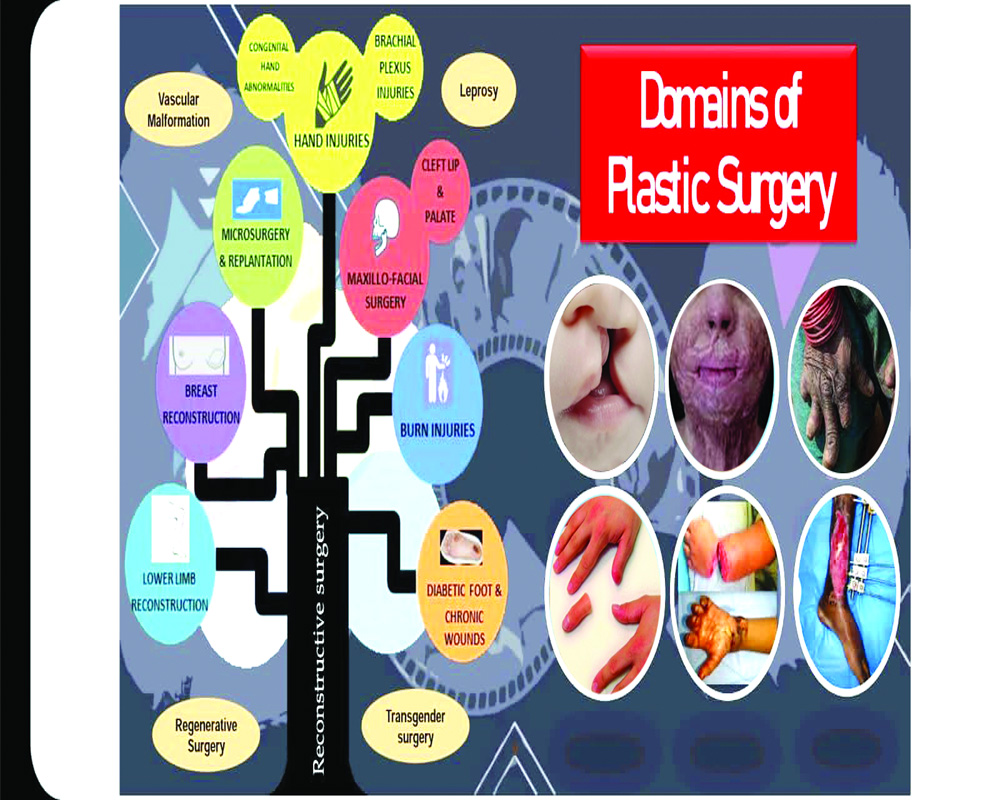It was a film festival with a difference. The occasion was National Plastic Surgery Day on July 15. The venue was AIIMS, Delhi. The event showcased heart-touching real-life stories of patients who battled crippling deformities, life-threatening trauma and burns, congenital diseases, and many more. And how plastic surgeons have been able to re-attach cut limbs, transplant hands from brain-dead donors, reconstruct the body after the removal of gigantic cancers etc. Thus, helping their patients regain confidence and carry out their daily work with dignity and confidence. ARCHANA JYOTI brings a report.
Contrary to the popular belief, aesthetic or cosmetic surgery offering services like hair transplantation, weight loss therapy, and facelift is just a part of the plastic surgery being conducted in the country. In fact, plastic surgery is more than that, asserts Dr Maneesh Singhal, Head of the Department of Plastic, Reconstructive and Burns Surgery, AIIMS, Delhi.
Besides performing aesthetic surgery, plastic surgeons are involved in conducting reconstructive surgeries- right from head to toe such as burns, trauma/cancer/pressure sore reconstruction, cleft lip/palate/craniomaxillofacial surgeries, hand surgeries, microsurgeries like replants/limb transplants, he said.
Every day, AIIMS Delhi conducts around 18 plastic surgeries while across the country, as per rough estimates, the figure is 7,500. The majority of these ie at least 50% involve burns and trauma reconstruction followed by congenital and cleft surgery 10%; hand surgery 10%, cancer reconstruction 1% and cosmetic surgery 20%.
Dr Singhal revealed that plastic surgery has been India's gift to the world with the great sage Sushruta, being the father of Plastic Surgery.
The doctor further said that it is recorded in history that the world's first plastic surgery was done in Kashi about 3 thousand years ago. When a person came to Maharishi Sushruta with a severed nose. First Sushruta made that person drink intoxicants so that he does not feel pain. Took part of the skin from his forehead, understood the shape of his nose through the leaf and made the nose with stitches and joined it.
“It is also recorded in Sushruta Samhita that Sushruta used 125 different surgical instruments in Sushrut Samhita. 12 types of fractures and 7 dislocations have been explained. The world needs to know the truth about plastic surgery, that's why this festival was named 'Sushruta Film Festival',” Dr Singhal said, adding that a study on ‘Sushruta as a plastic surgeon’ is in the pipeline.
AIIMS Director Dr Randeep Guleria said, “It was unfortunate that the public perception about what plastic surgery is and what it covers is still largely lacking.” He cited a study published in the International Surgery Journal in 2019 in which as many as 84 per cent of participants said plastic surgery involves only cosmetic surgery and 70 per cent said plastic is used in plastic surgery.”
Innovative ideas like this film festival will greatly help in altering perceptions about this field and how patients with debilitating diseases, cancers, trauma, burns, and congenital anomalies will benefit from it, Dr Guleria said. The doctors can rehabilitate the patient to a great extent, he added.
Dr Singhal informed that around 90 plastic surgeons and trainees from across India submitted nearly 120 short films on how lives were changed through plastic and reconstructive surgery of which 25 were screened at the film festival, organised in collaboration with the Association of Plastic Surgeons of India (APSI).
The best movie was adjudged to "Conquering Disability by Plastic Surgery" by Dr. Parag Sahasrabudhe from Pune. It was a story of a teenager, Mahesh Patil who had bone cancer in his leg, and was advised amputation. But thanks to the plastic surgery, his leg was saved. Thus, showing how plastic surgery can help a person to rebuild his life, dream big, do the unbelievable and achieve the extraordinary.
The second-best movie tag went to "From Despair to Hope" by dr. Subramania lyer from Kochi, Kerala. It highlighted the case of one Manu, who had lost both his hands in a train accident and was given a new hope, when his plastic surgeons offered him hand transplantation. Now, he has recovered well, and not only does his work by himself, but he also works as a transplant counsellor in the same hospital. The Third Movie was Kathrivel, by Dr. S. Raja Sabhapathy, from Coimbatore. It showed how plastic surgery can restore debilitating post-burn contractures.
Three more Special Awards were also given. These were “Hands that Help" (By Dr. Sunil Gaba from Chandigarh) about the reattachment of an amputated hand. It educates how important part preservation is and how a plastic surgeon can reattach parts, they are brought to them in time and in a properly preserved way. Two other movies were "Imperfectly Perfect" (Dr. Shivangi Saha, Delhi) about a patient, an acid attack victim and “Empowering Children through Microtia Surgery" (Dr. Parag Telang, Mumbai). It is a movie showing how difficult life is for kids born without ears and how a plastic surgeon can help restore their appearance back with their tireless efforts.
The best 25 movies were also given a consolation prize.
Two more movies "A rainbow of Life" (Dr. Richie Gupta, Delhi) and "Happy Veena"(Dr. Sunil Kalda, Raipur) earned praises as they addressed the issues of transgender health and role plastic surgeons can play by Gender Affirmation Surgery.
























